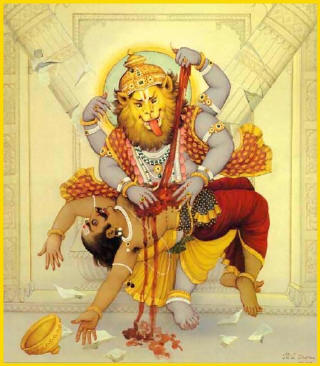Hindu Gods and Goddesses
Narasimhavataram
Maha Vishnu in the form of a half man
half lion

| The asura
kings Hiranyakshan and Hiranyakasibu were brothers, who were causing
untold misery to the sadhus, saints and to the God fearing. Lord Vishnu
had killed Hiranyakshan in his Varaha Avataram. Hiranyakasibu vowed to
avenge the death of his brother. He performed sever penance and became
all powerful as he had asked for a boon that he should not face natural
death. He cunningly thought of the most impossible combinations and
asked that he could be killed by neither man or beast, neither inside
nor outside, neither in the day time nor in the night, neither on land
nor in air and that he killed by no weapon.
This mighty asura had a son called Prahaladha, who turned out to be a great devotee of Lord Vishnu. Hiranyakasibu tried his utmost to convert the boy from his faith but failed miserably in all his attempts. He finally hardened his heart and decided to kill his own loving son, for showing reverence to his arch enemy Vishnu. He tried various methods such as dropping the child in the ocean, feeding him with poison, etc. but in vain. Every time Lord Vishnu rushed to save his devotee. The vexed asura asked his son where he could meet Lord Vishnu. Prahaladha replied that Lord Vishnu exists in every particle - from the minute dust to the huge pillar in the palace. On hearing this, the vexed Hiranyakasibu hit hard on the pillar with his gada, breaking it in two. Seated within was Lord Narasimha (Mahavishnu). He was in the guise of half man, half lion, i.e., a man with the head and claws of a lion (neither man nor beast). Narasimhar took Hiranyakasibu to the front step (neither in nor out) and tore him apart with his sharp claws (no weapon) in the evening - Sandhyakalam (neither day or night). Even after killing Hiranyakasibu, the Lord's anger did not diminish. The universe could not bear the ugram (anger) of the Lord. Goddess Lakshmi was called to soothe him. But even she feared his roused form. Everybody requested Prahaladhan to cool down the Lord with his prayers. In his angry form he is called Ugra Narasimhar and once he had cooled down he was referred as Lakshmi Narasimhar. He is seen in yet another meditative posture, when he is called Yoga Narasimhar. |